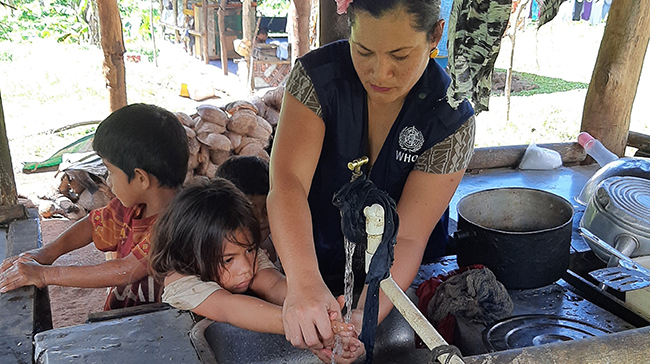
Samoa built on their established tradition of community engagement to prepare for COVID-19. Under the leadership of the Ministry of Health, the Health Emergency Operations Committee that was involved in the measles outbreak and recovery expanded their focus to COVID-19 when the global pandemic began. This involved broad multi-sector collaboration to develop and implement comprehensive preparedness plans. Stakeholders spanning government ministries, UN agencies, international partners, national organizations, women’s community groups, local leaders, and health care workers were involved in multiple preparedness initiatives, including extensive community engagement components.
Community outreach was planned and conducted across the four inhabited Samoan Islands of Upolu, Savai’i, Manono, and Apolima starting in March 2020. First, community sensitization sessions were held with over 200 village chiefs, mayors, religious leaders, and women’s community group representatives. This was followed by further nationwide outreach to prepare communities on how to respond should coronavirus reach their villages. Part of this outreach included the development and roll-out a training toolkit to engage communities in creating locally developed and owned plans for COVID-19.
To ensure Samoa leaves no one behind in their COVID-19 preparations, during the second phase of community outreach, a vulnerable household assessment was conducted by community nurses, women’s groups, and local leaders with support from the World Health Organization, Samoa Red Cross Society, Adventists Disaster Relief Agency, and partners. The goal of this assessment was to identify and directly reach out to the most vulnerable households throughout all four Samoan Islands. Households with high vulnerability received targeted outreach and additional support. This included the delivery of hygiene care packages and discussing household planning for COVID-19 on topics ranging from hand hygiene options for low-resource settings, quarantine and isolation, food stocks and more. This activity was undertaken to better understand families’ vulnerability to COVID-19, in recognition of the many barriers to COVID-19 prevention and care such as availability of clean water, soap or alcohol-based handrub for hand-washing and general hygiene.
These assessments started in April, and by the end of June more than 800 families vulnerable to COVID-19 were assessed and engaged. The vulnerability assessments were completed in September 2020, alongside a survey to guide the next steps of Samoa’s preparedness plans.
